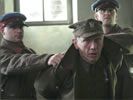Eye For Film >> Movies >> Katyn (2007) Film Review
Adrzej Wajda is the supreme chronicler of Poland’s tragic history. He has focused on her sufferings during the Second World War, her transformation into a Soviet client state (in his early masterpiece Ashes And Diamonds) and the Solidarity movement which took her, and the entire Eastern Bloc, down the first steps to freedom (in his monumental diptych, Man of Marble and Man Of Iron).
Even the film for which he’s probably best known to western audiences, 1984’s Danton, had clear parallels to his country’s history in its story of a disillusioned revolutionary making a stand against state-sponsored terror.

For my money, only Krzysztof Kieslowski rivals him for the title of ‘greatest every Polish filmmaker’. But, while Kieslowski films are hardly apolitical, they tell their stories through a tight focus on particular characters and intimate details. Wajda has always worked to a more widescreen, epic template.
Which is why his take on the Katyn massacre - one of the most tragic and heinous episodes in Polish history - was so eagerly awaited. Wajda, now in his eighties, was a young man when he learnt that his father was one of the victims. One almost feels that it is a story he has waited all his life to tell.
And while the film isn’t a complete success it’s still a powerful, heartfelt take on the cruelties of which people can be capable – and the courage and nobility they can display in their determination to find out the truth.
It opens in the aftermath of the Polish army’s defeat by the Germans in 1939. Anna (Maja Ostaszewska) is searching for her husband Andrzej (Artur Zmijewski) who has been taken prisoner, along with thousands of other soldiers. They are about to be handed over to the Soviets, who have used the Non-Aggression Pact with Hitler to take over half of Poland.
She finds Andrzej, but his sense of duty forces him to stay with his troops. Despite Anna’s pleas he allows himself to be taken to a Russian prisoner of war camp, along with his friend and fellow officer Jerzy (Andrzej Chyra).
The two men, together with thousands of other officers, intellectuals and prominent Polish figures disappear into a bureaucratic black hole and despite the efforts of Anna, and other anxious relatives, no information is forthcoming.
Two years later, when the Germans invade the Soviet Union and occupy Poland completely, they find evidence of a massacre in the Katyn forest. Analysis of the bodies proves that the killings must have taken place in 1940 and the Nazi propaganda machine makes full use of this example of Communist brutality.
The relatives, including Roza (Danuta Stenka) the wife of a senior Polish general, are ‘encouraged’ to go on the record denouncing the atrocity, while still being given no information as to whether their loved ones are among the victims. When Roza refuses to co-operate, it becomes clear that the Germans’ inquiry is not (to put it mildly) motivated by humanitarian concerns.
The nightmare continues when the war ends and the triumphant Soviets occupy Poland. Immediately a new inquiry is held to ‘prove’ that the killings in fact took place in 1941. As this was a period when the Germans occupied the Katyn region they must then be the killers – QED.
Many of the relatives refuse to accept this. This brings them into direct conflict with the new masters of Poland and they realise that their country has simply seen an exchange of tyrannies. But still they try to find out whether their husbands, sons and brothers were actually among the dead...
At times Katyn is an almost unbearably gruelling watch. Wajda clearly has personal experience of the methods of both Nazi and Soviet dictatorships and he depicts their unfeeling officiousness and contempt for individual life in forensic detail. But it’s a film as much about the heroism and dignity of the female relatives, enduring appalling treatment simply to achieve the basic information allowing them some sort of closure – information that should be theirs by right.
The film’s principal focus is on them, rather than the men waiting in the camps to die, but in trying to encompass several different stories, it does lose some dramatic thrust. As is often the case in Wajda’s work, major characters appear with little introduction or explanation and the audience is left to find out more as the narrative unfolds. This undoubtedly reflects the chaos and confusion of the time but, to put it bluntly,it’s sometimes hard to work out who’s who, and exactly what their connections are to the victims.
A little prior knowledge of the history of the period wouldn’t hurt either, but these are minor flaws. This is a film full of telling images – a crucifix in a bomb-damaged church with only the arm attached, a child taking pity on a stray dog among a flood of refugees – and superb performances. Stenka and Ostaszewska radiate a worn stoicism as they struggle to find the truth while caring for their children in a world where simply staying alive is a daily battle and, as the two friends who share a tragic destiny when the day of the massacre finally arrives, Chyra and Zmijewski offer moving portraits of ordinary men trying to cope with the surreal horrors and grim ironies of war.
Not a fellgood Friday nighter, by any means. But as these events recede even further from living memory it’s more vital than ever that these stories are told. And one of cinema’s finest storytellers has told one of his country’s saddest stories superbly.
Reviewed on: 19 Jul 2009


















